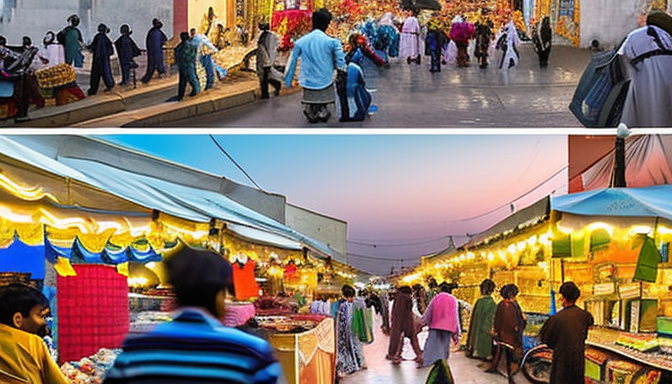Karachi, a bustling metropolis, is not just a city; it’s a melting pot of cultures and histories. Over the years, it has been home to many remarkable individuals whose stories are woven into the very fabric of this vibrant place. From politicians to artists, each personality has left a unique mark, shaping Karachi’s identity in profound ways.
Take, for instance, the legendary Allama Iqbal. He wasn’t just a poet; he was a visionary. His words inspired a nation and sparked movements. I remember reading his poetry in school. It felt like he was speaking directly to my heart, urging us to dream big. His legacy continues to resonate, reminding us of the power of words.
Then there’s Fatima Jinnah, a trailblazer in her own right. As a lawyer and activist, she fought tirelessly for women’s rights. Imagine a time when women were often silenced. Fatima stood up, her voice echoing in the halls of power. She showed us that courage can change the course of history.
In contemporary times, we see icons like Abdul Sattar Edhi, whose humanitarian efforts transformed countless lives. His simple philosophy of serving humanity reminds us that kindness knows no boundaries. Karachi’s streets are filled with stories of people he helped, each a testament to his incredible spirit.
These personalities, among many others, have not only influenced Karachi but also inspired generations. Their stories are a reminder that one person’s impact can ripple through time, shaping the future in unexpected ways. As we explore these lives, we uncover the essence of what makes Karachi truly special.
Historical Figures of Karachi
Karachi, a city rich in history, has been shaped by remarkable individuals whose contributions echo through time. These historical figures have not only influenced the city but also left an indelible mark on the broader canvas of Pakistan’s history. Take, for instance, the legendary Quaid-e-Azam Muhammad Ali Jinnah. As the founder of Pakistan, his vision and determination transformed Karachi into the nation’s first capital. Jinnah’s legacy is not just in politics; it’s in the very essence of what Karachi stands for today.
Another notable figure is Allama Iqbal, a poet and philosopher whose words ignited the spirit of nationalism among the people. His poetry, rich with themes of freedom and identity, resonates even now. Iqbal’s influence can be seen in the vibrant cultural fabric of Karachi, where art and literature thrive. His vision of a separate homeland for Muslims laid the groundwork for a movement that would change the course of history.
Moreover, let’s not forget Fatima Jinnah, a trailblazer in her own right. As a fierce advocate for women’s rights, she played a crucial role in the political landscape of her time. Her efforts to empower women in Karachi and beyond were groundbreaking. She showed that the fight for equality was not just a man’s battle.
These figures, among many others, represent the spirit of Karachi. Their stories remind us that the city’s past is a tapestry woven with courage, vision, and resilience. It’s a reminder that every street, every corner has a tale to tell, echoing the dreams and struggles of those who walked before us.

Contemporary Icons from Karachi
Karachi is a melting pot of culture and creativity, and its contemporary icons are a testament to that vibrancy. These individuals have not only left their mark on the city but have also influenced the wider world. Take Abdul Sattar Edhi, for example. His life was a beautiful tapestry of compassion and service. He founded the Edhi Foundation, which provides essential services to those in need, embodying the spirit of giving. It’s hard to imagine Karachi without his legacy of kindness.
Then there’s Malala Yousafzai, a name that resonates globally. Born in Mingora, she became a beacon of hope for girls’ education after surviving an attack by the Taliban. Her courage is a powerful reminder that one voice can challenge the status quo. Malala’s journey from a small town to winning the Nobel Prize is nothing short of inspiring.
In the realm of arts, Abdullah Qureshi stands out. A musician who blends traditional and modern sounds, he captures the essence of Karachi in his songs. His lyrics often reflect the struggles and joys of city life, making him a voice for the youth.
These icons, along with many others, shape the narrative of Karachi today. They remind us that a city is not just its buildings or streets; it’s the people who breathe life into it. Their stories are not just tales of success; they are lessons in resilience, passion, and the power of dreams.
Frequently Asked Questions
- Who are some historical figures from Karachi?
Karachi has been shaped by many remarkable historical figures, including Quaid-e-Azam Muhammad Ali Jinnah, the founder of Pakistan, and Fatima Jinnah, a prominent political figure. Their contributions have significantly influenced the city’s identity and development.
- What contemporary icons are associated with Karachi?
In the modern era, personalities like Abdul Sattar Edhi, known for his humanitarian work, and Malala Yousafzai, a global advocate for education, have emerged from Karachi, showcasing the city’s rich talent pool.
- How has Karachi’s culture been influenced by its famous personalities?
The contributions of Karachi’s notable figures have woven a vibrant tapestry of culture, impacting everything from art and literature to politics and social reforms, making the city a melting pot of ideas and traditions.
- Why is it important to learn about these personalities?
Understanding the lives and achievements of Karachi’s famous personalities not only honors their legacies but also inspires future generations to contribute positively to society and embrace their cultural heritage.